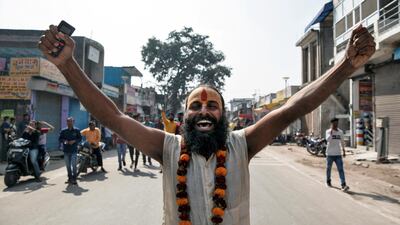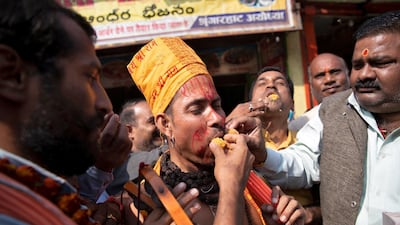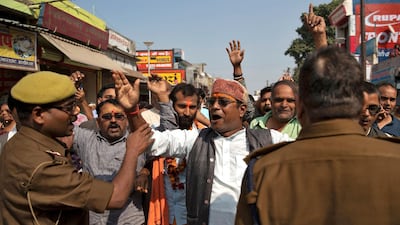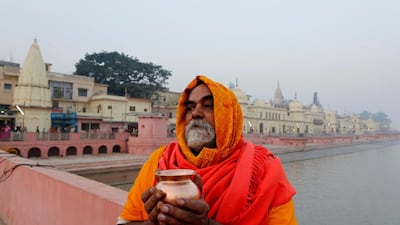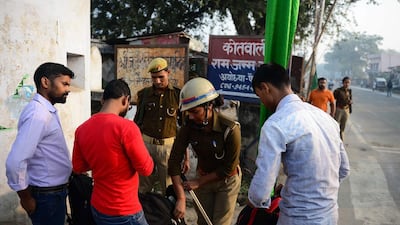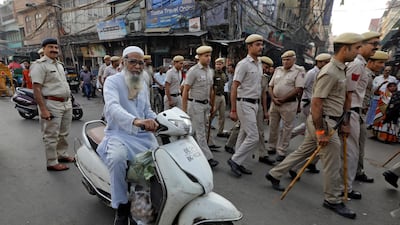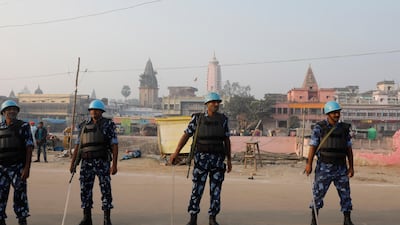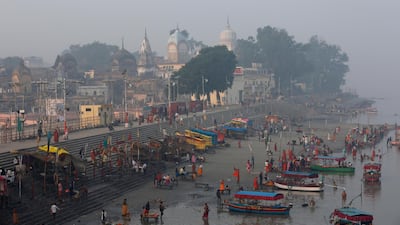India’s Supreme Court on Saturday awarded a long-disputed religious site in the northern town of Ayodhya to Hindu petitioners, overruling Muslim claims to the land where a 16th-century mosque had stood until it was demolished by Hindu mobs in December 1992.
The verdict was delivered amid heightened security in many parts of India to prevent a repeat of the religious violence that followed the razing of the mosque. More than 5,000 security personnel were deployed in Ayodhya. Schools and colleges were shut for the day.
In Mumbai, where nearly 900 people were killed within a week in the 1992 riots as Hindu mobs targeted Muslims, the assembly of more than four people at any spot was temporarily banned.
Prime Minister Narendra Modi appealed for calm on Twitter. “This verdict shouldn’t be seen as a win or loss for anybody,” he said.
The Babri Masjid, built in 1528, was torn down by Hindu nationalists who believed the site to mark the location of both an older temple and the birthplace of Ram, a Hindu deity.
The tussle between Hindus and Muslims over the 1.1-hectare site has been running since the 19th century. But there was also a history of the communities praying together in the now-demolished mosque. Hindus would use the outer courtyard, while Muslims prayed further inside.
Saturday’s unanimous verdict by a five-judge bench acknowledged the opinion of archaeologists that while the mosque was built over some older structure, it could not be established whether that structure was a temple, as Hindu groups claimed.
Nevertheless, the court held that the Hindu belief in the sanctity of the site “cannot be held groundless”, and that this belief predated the construction of the mosque. It instructed the government to set up a trust to build a Ram temple at the site. Separately, it awarded the Sunni Wakf Board, one of the Muslim petitioners in the case, 2 hectares of land elsewhere in Ayodhya.
Zafaryab Jilani, a representative of the Waqf Board opposed the ruling.
"We are not satisfied with the verdict and it's not up to our expectation," he said according to AP. "These (2 hectares) of land don't mean anything to us. We are examining the verdict and whatever legal course is open for us.2
The verdict not only ends a decades-old dispute but also brackets an era in which Mr Modi and his Bharatiya Janata Party (BJP) rose to power through the polarised politics triggered by the Babri Masjid’s demolition.
In 1990, one of the BJP’s senior leaders, L K Advani, undertook a “rath yatra”— a drive across the country in a motorised chariot, in order to drum up support for a Ram temple to be built in place of the Babri Masjid. During that journey, Mr Modi accompanied Mr Advani in the converted Toyota “chariot”. At the time, he was a member of the Rashtriya Swayamsevak Sangh (RSS), the Hindu nationalist group that is the ideological parent of the BJP.
Members of the RSS, the BJP and other Hindu groups descended upon the Babri Masjid and razed the structure on December 6, 1992. The Supreme Court decision on Saturday called this act illegal but, as this was a civil case, did not set out any punishment for the leaders of the demolition. That decision is to be made as part of a criminal case still pending in a lower court.
Ever since the destruction of the mosque, the building of a Ram temple on the site has been a fixture in every BJP election manifesto. Leaders invoked it often in campaign rallies. A slogan was born: “Mandir wahin banega” or “The temple will be built only there”. The issue of the temple lay at the core of a culture of polarising, anti-minority politics that the BJP used to rise to power.
The opposition Congress party, under whose watch the mosque was demolished in 1992, has frequently proposed a negotiated settlement between the two communities. On Saturday, though, the Congress indicated it supported of the court verdict. “This judgment not only opened the doors for the temple’s construction but also closed the doors for BJP and others to politicise the issue,” spokesman Randeep Surjewala said.
Peer Mohamed, a political analyst who runs the political website Ippodhu, said the resolution of the issue would remove one of the most crucial electoral planks of the BJP. “But their political rhetoric will get strengthened,” he said.
A number of other issues on the BJP’s agenda rely upon drawing lines between the Hindu majority and other minorities. In Assam, for instance, a national register of citizens – intended to exclude illegal Bangladeshi immigrants – has left tens of thousands of Muslims off the list.
Similarly, in the Muslim-majority region of Kashmir, civil liberties have been restricted ever since the special constitutional status of the state of Jammu and Kashmir was suspended in August.
Commentators expressed concern over the precedent set by the Supreme Court ruling. That it was delivered “at a time when the party in power today is one which openly asserts its partisanship on Ayodhya should be reason enough to worry us about happens next to the republic,” wrote Siddharth Varadarajan, the editor of The Wire, a news and opinion website.
Muslim politicians expressed their disappointment as well. Asaduddin Owaisi, a parliamentarian and the head of the All India Majlis-e-Ittehadul Muslimeen, told reporters that “faith has won out over the facts”. He described the offer of 2 hectares of land elsewhere in Ayodhya as demeaning, saying, “Don’t patronise us.”
Mr Mohamed worried that the verdict showed the judiciary yielding to the BJP’s majoritarian instincts. It broke the notion that all Indians were equal in the eyes of the law, he said.
“At the same time, I hope this will make people step up and defend these principles of equality – step up not as members of one religion or another, but as ordinary people, as a public,” he said. “We have to see if that will happen. This is a tipping point for Indian democracy.”
